Atoll All in One preAmplifier
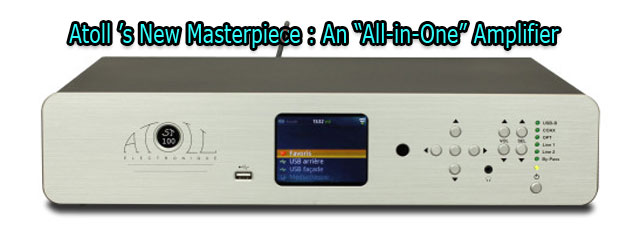
This week, I want to share a review of Atoll’s new and highly gifted integrated amplifier (the SDA100); this review is based on my personal experiences and an audition. I combined the SDA100 with one of Atoll’s devilishly efficient CD “drives”, Atohm’s formidable GT1 speakers, and a set of Atohm ZEF MAX cables. Together, they formed a dynamic and very lively group.
I caught a brief glimpse of the SDA100 when I visited Atoll’s stand during this year’s High End Show in Munich. Recently, I managed to get ahold of this latest addition to Atoll’s amplifier line. It is a modern, multifunctional machine: an integrated amplifier, DAC (digital-to-analog converter), and streamer all rolled into one.
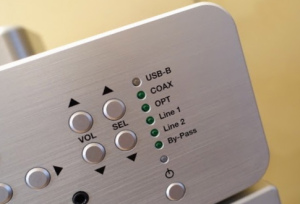
General description and features
The SDA100 is, above all, a very “social” preamplifier: it can recognize a variety of peripheral devices and read a number of different file formats. Equipped with a DAC, it can directly connect to computers via two dedicated USB ports (one of which allows asynchronous 24-bit/192KHz input) or a classical RJ45 Ethernet port. It can also connect to mobile devices via Bluetooth aptX technology or a dedicated USB port found on its face. Joining these ports are a couple others: two digital ports (for coaxial and optical cables) and an analog port. Up to this point in the description, the SDA100 does not seem to differ from many other devices on the market. Integrating DACs into amplifiers is fast becoming the standard as the world of digital music files expands. However, the SDA100 actually goes a lot further by also integrating a streamer, which, once connected to your local network (via Ethernet cable or WIFI), can easily read files in a variety of formats (including FLAC/WAV [up to 24 bits/192 kHZ], ALAC, AIFF, and MP3 files). These files can be located anywhere in your local network, whether stored on a NAS (network-attached-storage) drive, a computer, or a mobile device. The SDA100’s integrated internet access also means that it can tune in to 1,500 internet radio stations. In addition to streaming music live, you can also listen to any podcasts produced by programs on these radio stations (provided they offer this service).
As far as the integrated DAC goes, Stéphane Dubreuil, co-founder of Atoll, has a couple of things to add: “We chose to go with a high-quality Burr Brown converter that is capable of up to 32-bit resolution. We wanted to keep the number of components to a minimum because, as everyone knows, more components means more sources of disturbance.”
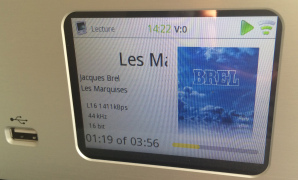
The SDA100’s brushed aluminium face made a good impression on me. The device has an elegant, understated design. At first glance, the quality of its workmanship and finishing suggests that it is undoubtedly a solid piece of machinery. I nonetheless have two minor complaints: there is no volume button and the control screen on the face could be larger, or at least offer the possibility of viewing full-screen versions of the covers of the albums being played. However, it is true that the ability to use your tablet as a navigation device compensates for this latter issue.
Keeping true to its reputation, Atoll has created a device that once more affirms the brand’s well-known reliability. It acts a fully functional streamer; its efficiency is remarkable. Admittedly, connecting it to the network may prove a bit challenging if you are a novice. However, it would be unfair to describe this device purely in terms of its technical abilities. When it comes to its ability to reproduce music, it is undeniably ahead of the pack. The DAC very easily filters the stream of tiny bits of information to offer up a lively musical result.
My opinion of the SDA100, in brief
I liked:
the high quality of its workmanship
its beautiful finish
the efficacy of the network connection
the DAC’s production of high-quality music
the excellent balance between quality, features, and price
I was a bit disappointed by:
the lack of a volume button
the overly small size of the control screen on the device’s face
the complexity of connecting the device to the network for the first time

The DR100 CD “Drive”
Atoll hasn’t forgotten CD lovers. Its DR100SE2 CD “drive” is a device that has solely retained the ability to read CDs; it therefore relies on the SDA’s integrated converter, to which it can connect via the digital coaxial port. Atoll based the drive’s design on that of one of its existing CD players (CD100SE2). However, the DR100 is an entirely new machine in terms of its mechanics, power supply, and the improvements made to its chassis. Stéphane Dubreuil explains the rationale behind the CD drive’s design: “We were, above all, looking to preserve signal integrity, and we wanted to limit the disturbances that pollute sound reproduction. To do this, we focused, technologically speaking, on augmenting the power supply and coming up with materials with insulating properties. We used an entirely empirical approach when designing this device. We arrived at the final product via a variety of technical measurements, but we also relied on the results of many blind sound tests.”
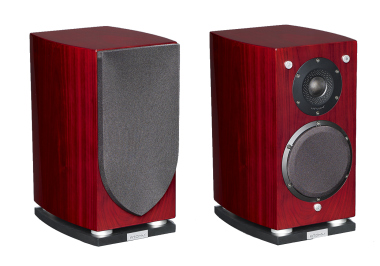
Pairing the SDA100 with Atohm GT1 speakers
Coupling the SDA100 with a pair of Atohm GT1 speakers led to a blissful arrangement, as though the two were made for each other. I have often been impressed at how the GT1s perform in a variety of systems. However, in this case, the pairing was truly delicious and led to bright and lively results. The SDA100 is highly efficient and delivers an extremely detailed signal, features that were beautifully enhanced by the presence of the GT1s, which always manage to showcase the abilities of the most demanding sources and inputs. It appears that the two manufacturers share a common goal: to respect the integrity of the original signal by striving for a high degree of neutrality and watching out for the music’s best interests. This approach is very different from that used by companies whose products seek to color sound in a flattering way but that always end up “exhausting” our precious ears instead.
Purchasing an SDA100 and a pair of GT1 speakers will cost you less than €5,000, which remains reasonable given the musical pleasure they provide. This coupling represents a very good option that will last and provide undeniably good musical results for anyone who wants to take full advantage of the benefits of digital music files. You should embrace this marriage of reason and passion!


Prices : SDA 100/200 : 2300 € / 2800€ – Driver DR 100/200 : 800€ / 1200 € – Atohm GT1 (la paire) : 2500 € – Atohm ZEF Max : 45 € per meter
Technical specifications for the Atoll SDA line and DR Drive line.
Technical specifications for the Atohm GT1 and ZEF MAX cables.
This article originally appeared in Michel Aublanc’s The State of Sound in France (link below)
Stereo Times Masthead
Publisher/Founder
Clement Perry
Editor
Dave Thomas
Senior Editors
Frank Alles, Mike Girardi, Russell Lichter, Terry London, Moreno Mitchell, Paul Szabady, Bill Wells, Mike Wright, and Stephen Yan,
Current Contributors
David Abramson, Tim Barrall, Dave Allison, Ron Cook, Lewis Dardick, John Hoffman, Dan Secula, Don Shaulis, Greg Simmons, Eric Teh, Greg Voth, Richard Willie, Ed Van Winkle, Rob Dockery, Richard Doron, and Daveed Turek
Site Management Clement Perry
Ad Designer: Martin Perry



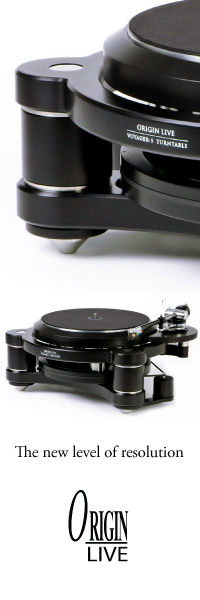
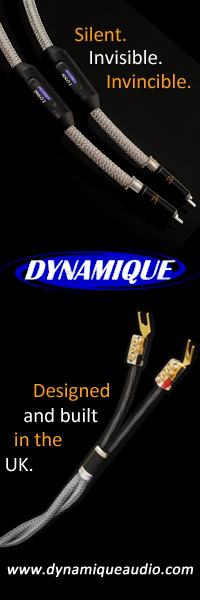
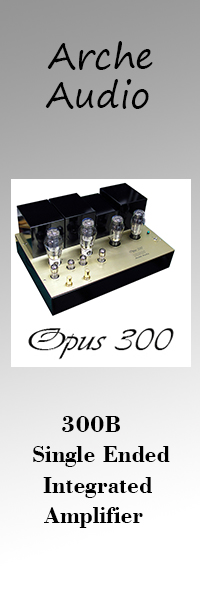
Be the first to comment on: Atoll All in One preAmplifier